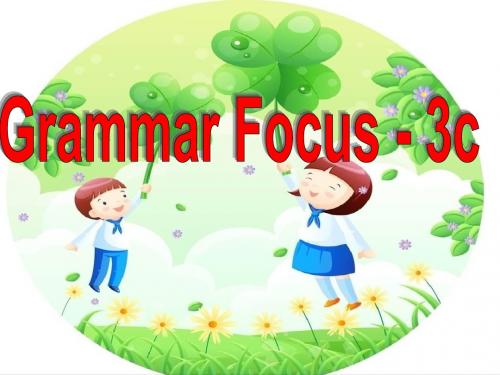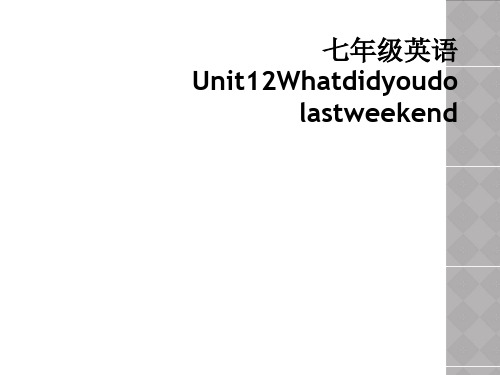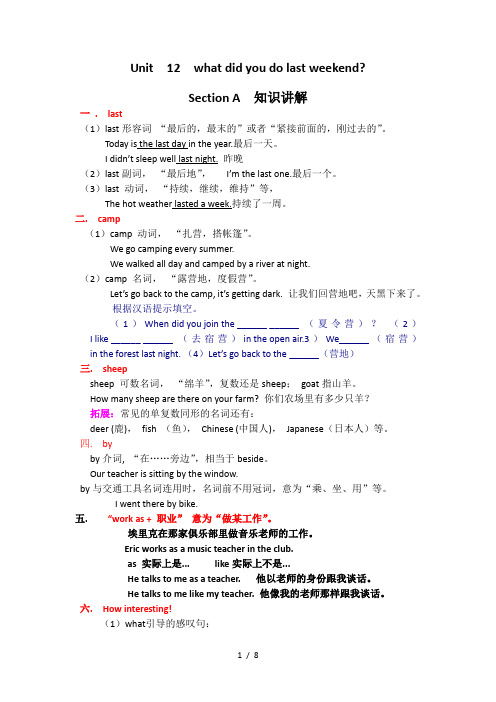七年级英语下册Unit12WhatdidyoudolastweekendSectionB(2a-3b)教案(新版)人教新目标版
- 格式:doc
- 大小:121.50 KB
- 文档页数:2



![七年级-人教版-英语-下册-[基础诊断]Section-B-(1a-1e)](https://img.taocdn.com/s1/m/1d90867cfd4ffe4733687e21af45b307e971f90f.png)
Unit 12 What did you do last weekend? (Period 3)Section B (1a-1e)Ⅰ.单项选择。
1.Linda ________ in front of the class yesterday afternoon.A.plays piano B.plays the pianoC.played piano D.played the piano2.—Let’s play badminton.—Sorry. I have to study ________ a test.A.to B.for C.with D.on3.I feel ________. I want to go to bed early ________.A.tired; to relax B.tiring; relaxingC.tired; relaxing D.tiring; relaxed4.Don’t shout ________ your parents. It’s impolite (不礼貌的).A.at B.to C.with D.for5.Did you see ________ in the zoo?A.anything interesting B.interesting anythingC.something interesting D.interesting somethingⅡ.阅读理解。
Some friends are talking about their last weekend.Jenny: On Saturday morning, I helped my mother clean the room and did some washing. I was tired. In the afternoon, I visited my cousin. We played computer games and watched TV. It rained all day. It was boring.John: I had a great time. My brother Nick came back from England, so we had a welcome party for him. We haven’t seen each other for a long time. We were happy. We sang and danced together and we ate a big cake in the end.Li Ming: I had a busy weekend. We will have a math exam on Monday. So I had to study for the exam. Math is not easy for me, so I must study very hard.Peter: I went shopping with my mother on Saturday afternoon. There is a new supermarket nearmy home. It is very big. There were many people there that afternoon. My mother bought a new jacket for me.6.What did Jenny and her cousin do on Saturday afternoon?A.They played computer games and watched TV.B.They went shopping together.C.They played the piano.D.They studied very hard.7.Who had a party?A.Jenny.B.Peter.C.Li Ming.D.John. 8.How does Li Ming feel about math?A.He feels it very easy.B.He feels it very interesting.C.He feels it hard.D.He likes it very much.9.Where is the new supermarket?A.It is near Peter’s school.B.It is in the town.C.It is near a fast food restaurant.D.It is near Peter’s home.10.What did Peter’s mother buy for him?A.A lot of food.B.A basketball.C.A new jacket.D.A computer.Ⅲ.用所给词的适当形式填空。

Unit 12 what did you do last weekend?Section A 知识讲解一. last(1)last形容词“最后的,最末的”或者“紧接前面的,刚过去的”。
Today is the last day in the year.最后一天。
I didn’t sleep well last night. 昨晚(2)last副词,“最后地”,I’m the last one.最后一个。
(3)last 动词,“持续,继续,维持”等,The hot weather lasted a week.持续了一周。
二. camp(1)camp 动词,“扎营,搭帐篷”。
We go camping every summer.We walked all day and camped by a river at night.(2)camp 名词,“露营地,度假营”。
Let’s go back to the camp, it’s getting dark. 让我们回营地吧,天黑下来了。
根据汉语提示填空。
(1)When did you join the ______ ______ (夏令营)?(2)I like ______ ______ (去宿营)in the open air.3)We______(宿营)in the forest last night. (4)Let’s go back to the ______(营地)三. sheepsheep 可数名词,“绵羊”,复数还是sheep;goat指山羊。
How many sheep are there on your farm? 你们农场里有多少只羊?拓展:常见的单复数同形的名词还有:deer (鹿),fish (鱼),Chinese (中国人),Japanese(日本人)等。
四. byby介词, “在……旁边”,相当于beside。
Our teacher is sitting by the window.by与交通工具名词连用时,名词前不用冠词,意为“乘、坐、用”等。

Unit 12 What did you do last weekend?【短语归纳】1.do my homework 做作业2.go to the cinema 去看电影3.go boating 去划船4.by the lake 在湖边5.go to the beach 去海滩6.play badminton 打羽毛球7.visit my grandma 看望我奶奶8.study for the English test 为英语测验而学习备考9.the Natural History Museum 自然历史博物馆10. kind of 有点儿11.stay up 深夜不睡,熬夜12. give back 归还13.be afraid 害怕14. play the guitar 弹吉他15.go to the library 去图书馆16. in a swimming pool 在游泳池里17. shout at… 冲……大声叫嚷18. high school 高中,中学19.fly kites 放风筝、20. go camping 去野营21.put up 搭建22 .make a fire 生火23.tell stories 讲故事24 .each other 互相25.go to sleep 入睡26.get a surprise 吃惊27.shout to… 呼喊……喊叫…… 28.up and down 来来回回;上上下下29.wake…up 把……弄醒30.do my homework 做我的家庭作业31.on Saturday morning 在星期六早上32.have a good weekend 周末过得愉快33.the next morning 第二天早上34.work as 以……身份而工作35.run away 跑开36.move into … 移进……【用法集萃】1. go + doing 去做某事2. play + 球类玩……球3. 时间段+ ago ……前4. keep + sb. / sth. + 形容词/ 副词/ 介词短语使……保持……5. so + 形容词/ 副词+ that 句子如此……以至于……6. see sb. doing sth. 看见某人正在做某事7. let sb. do sth. 让某人做某事8. start to do / doing sth. 开始做某事【经典范文】I had a busy weekend. On Saturday morning, I did my homework, and then I played computer games. In the afternoon, I visited my grandmother. We talked for a long time.On Sunday morning, I cleaned my room and did some reading. Then I cooked for m parents. In the afternoon, I watched a football match on TV and listened to music. I had a good time.知识点解析1. 表示““过去”的时间。
Unit 12 What did you do last weekend?Section A, 1bBob: Hey, Lucy.你好,露西。
Lucy: Hi, Bob.你好,鲍勃。
Bob: How was your weekend?周末过得怎么样?Lucy: It was great.很好。
Bob: So, what did you do?那你都做什么了?Lucy: Well, on Saturday morning, I played badminton. In the afternoon, I went to the beach, and at night, I went to the cinema.周六上午我打了羽毛球,下午我去了沙滩,晚上去看了电影。
Bob: Cool. What about Sunday?不错。
周日呢?Lucy: In the morning, I camped by the lake with my classmates. In the afternoon, we went boating, and at night, I did my homework.上午我和同学在湖边露营。
下午,我们去划船,然后晚上我做了作业。
Section A, 2a, 2bTeacher: So, did everyone have a good weekend?大家周末过得好吗?Students: Yeah, we did, Ms. Clark!是的,很好,克拉克女士!Teacher: Good. What did you do last weekend, Becky?很好。
贝姬,上周末你做什么了?Becky: I visited my grandma, and I did my homework.我去看我祖母,然后做了作业。
Teacher: Great. And how about you, Carol?不错。
Unit 12 What did you do last weekend(讲义及答案)Unit 12 What did you do last weekend?(讲义)Part 1 Words and Expressionscamp /kæmp/ v. 扎营;搭帐篷lake /leɪk/ n. 湖;湖泊beach /biːtʃ/ n. 海滩;沙滩badminton /'bædmɪntən/n. 羽毛球运动sheep /ʃiːp/ n. 羊;绵羊as /æz/ prep. & adv. 作为;当作natural /'nætʃərəl/adj. 自然的butterfly /'bʌtə(r)flaɪ/ n. 蝴蝶visitor /'vɪzɪtə(r)/n. 游客;访问者tired /taɪə(r)d/adj. 疲倦的;疲劳的stay /steɪ/ v. 停留;待stay up late 深夜不睡;熬夜away /ə'weɪ/ adv. 离开;远离run away 跑开mouse /maʊs/ n. (pl. mice /maɪs/) 老鼠;耗子baby /'beɪbi/ adj. 幼小的n. 婴儿shout /ʃaʊt/ v. 呼叫;喊叫shout at …冲……大声叫嚷woof /wʊf/ interj. (狗叫声)汪汪language /'læŋgwɪdʒ/ n. 语言fly /flaɪ/ v. (flew /fluː/)飞kite /kaɪt/ n. 风筝fly a kite 放风筝high /haɪ/ adj. & adv. 高的(地)high school 中学ago /ə'gəʊ/ adv. 以前India /'ɪndiə/n. 印度tent /tent/ n. 帐篷put up 搭起;举起moon /muːn/ n. 月亮surprise /sə(r)'praɪz/ n. 惊奇;惊讶v. 使吃惊get a surprise 吃惊snake /sneɪk/ n. 蛇开始做某事surprise n. 惊奇;惊讶v. 使吃惊You didn’t know my surprise when I he ard that news.My sister and I got a terrible surprise yesterday.get a surprise 吃惊Jimmy’s words surprised me a lot.It surprised us to see Jane get up soearly. surprise sb. 使……吃惊n. 意想不到的事;惊喜It’s a lovely surprise to see youagain. I have a little surprise foryou.shout v. 呼叫;喊叫There’s no need to shout. I am notdeaf! We could hear them shoutingfor help. shout at…s hout to…The bus driver is shouting at the oldman. Don’t shout at me. I don’t likethat.I had to shout to Tom because he was so far from me.My mother shouted to me on the other side of the road, but I still couldn’t hear her w ords.shout at…对……叫嚷,多指因shout to…对……喊,多指因Part 2 Role-playRole-play the conversation.Paul: Hi, Lisa. How was yourweekend? Lisa: Great, thanks.Paul: What did you do?Lisa: I worked as a guide at the Natural HistoryMuseum. Paul: Really? How interesting!Lisa: Yeah, it was fun. They have butterfly house with over 200 kinds of butterflies! I told the visitors about themand their living habits. Did you have a good weekend? Paul: Yeah, it was good, but I’m kind of tired now. I stayed up late to watch the soccer game.How interesting!Look at the bird. How beautiful!I had a terrible weekend. How tired!Five hours ago we left Beijing on this train, but now we’re arriving in Shanghai! How fast!I got on the bus one hour ago. How slowly!how 引导感叹句,译为“多么……;真……”,后面接或。
七年级下册Unit 12 What did you do last weekend一、教学目标:1. 语言知识目标:1)掌握以下单词:camp, lake, beach, badminton, sheep, as, natural, butterfly, visitor, tired, stay, stay up late.能掌握以下句型:①—Where did you do last weekend, Lucy?—I went to summer camp.②—How was your weekend?—Pretty good, thanks③—I worked as a guide at the Natural History Museum.④—How interesting!2) 能了解以下语法:learn to talk about recent past events.◆短语归纳1. do my homework 做我的家庭作业2.go to the cinema 去电影院= go to the movies3. go boating / camping 去划船/ 去野营4. play badminton 打羽毛球5. on Saturday morning 在星期六早上6. work as 以……身份而工作7. have a good weekend 周末过得愉快8. kind of 有点儿9. stay up late 熬夜10. run away 跑开11. shout at 对……大声叫嚷12. fly a kite 放风筝13. high school 中学14. put up 搭起,举起15. in the countryside 在乡下16. get a surprise 吃惊17. make a fire 生火18. each other =one another互相19. so… that…如此……以至于……20. go to sleep 入睡21. the next morning 第二天早上22. look out of…向……外看23. shout to/at 冲……呼喊24. up and down 上上下下25. wake…up 把……弄醒26. over=more than 多于27.By the lake在湖边28.. a swimming pool 一个游泳池29.study for a test.备考30.under the moon在月亮下31.in the sun.在阳光下32.tell stories讲故事33.get/be lost 迷路34.a second language 另一种语言35.visit sb.拜访某人36.feed sheep喂养37.learn from 从...中获得38.in danger 处于危险中◆用法集萃1. go + doing 去做某事2. play + 球类玩……球3. 时间段+ ago ……前4. keep + sb. / sth. + 形容词/ 副词/ 介词短语使……保持……5. so + 形容词/ 副词+ that 句子如此……以至于……6. see sb. doing sth. 看见某人正在做某事7. let sb. do sth. 让某人做某事8. start to do / doing sth. 开始做某事9.finish doing sth。